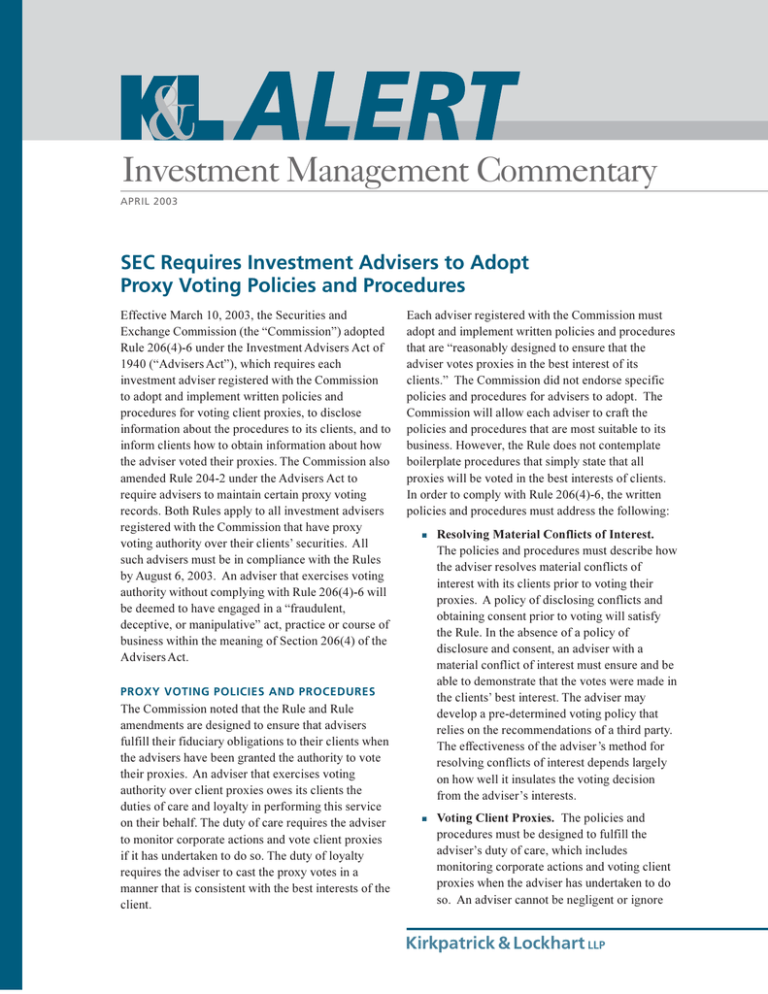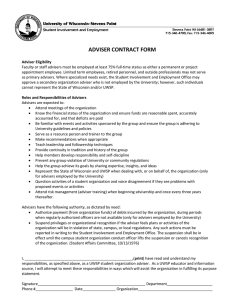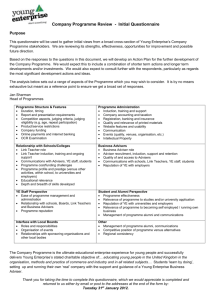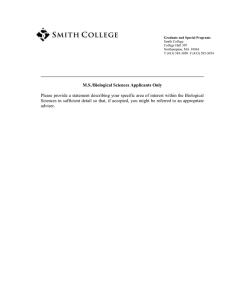
Investment Management Commentary
APRIL 2003
SEC Requires Investment Advisers to Adopt
Proxy Voting Policies and Procedures
Effective March 10, 2003, the Securities and
Exchange Commission (the Commission) adopted
Rule 206(4)-6 under the Investment Advisers Act of
1940 (Advisers Act), which requires each
investment adviser registered with the Commission
to adopt and implement written policies and
procedures for voting client proxies, to disclose
information about the procedures to its clients, and to
inform clients how to obtain information about how
the adviser voted their proxies. The Commission also
amended Rule 204-2 under the Advisers Act to
require advisers to maintain certain proxy voting
records. Both Rules apply to all investment advisers
registered with the Commission that have proxy
voting authority over their clients securities. All
such advisers must be in compliance with the Rules
by August 6, 2003. An adviser that exercises voting
authority without complying with Rule 206(4)-6 will
be deemed to have engaged in a fraudulent,
deceptive, or manipulative act, practice or course of
business within the meaning of Section 206(4) of the
Advisers Act.
Each adviser registered with the Commission must
adopt and implement written policies and procedures
that are reasonably designed to ensure that the
adviser votes proxies in the best interest of its
clients. The Commission did not endorse specific
policies and procedures for advisers to adopt. The
Commission will allow each adviser to craft the
policies and procedures that are most suitable to its
business. However, the Rule does not contemplate
boilerplate procedures that simply state that all
proxies will be voted in the best interests of clients.
In order to comply with Rule 206(4)-6, the written
policies and procedures must address the following:
n
PROXY VOTING POLICIES AND PROCEDURES
The Commission noted that the Rule and Rule
amendments are designed to ensure that advisers
fulfill their fiduciary obligations to their clients when
the advisers have been granted the authority to vote
their proxies. An adviser that exercises voting
authority over client proxies owes its clients the
duties of care and loyalty in performing this service
on their behalf. The duty of care requires the adviser
to monitor corporate actions and vote client proxies
if it has undertaken to do so. The duty of loyalty
requires the adviser to cast the proxy votes in a
manner that is consistent with the best interests of the
client.
n
Resolving Material Conflicts of Interest.
The policies and procedures must describe how
the adviser resolves material conflicts of
interest with its clients prior to voting their
proxies. A policy of disclosing conflicts and
obtaining consent prior to voting will satisfy
the Rule. In the absence of a policy of
disclosure and consent, an adviser with a
material conflict of interest must ensure and be
able to demonstrate that the votes were made in
the clients best interest. The adviser may
develop a pre-determined voting policy that
relies on the recommendations of a third party.
The effectiveness of the advisers method for
resolving conflicts of interest depends largely
on how well it insulates the voting decision
from the advisers interests.
Voting Client Proxies. The policies and
procedures must be designed to fulfill the
advisers duty of care, which includes
monitoring corporate actions and voting client
proxies when the adviser has undertaken to do
so. An adviser cannot be negligent or ignore
Kirkpatrick & Lockhart LLP
its duty to vote client proxies when it has
assumed the obligation. Depending on the
extent to which the roles are self-evident to the
clients, the policies may need to contain the
following disclosures of the parties responsible
for fulfilling the duty of care:
personnel responsible for monitoring
corporate actions;
personnel responsible for making voting
decisions; and
personnel responsible for ensuring that
proxies are timely submitted.
The Commission recommends that the policies and
procedures address factors that the adviser would
consider when voting on certain types of issues, such
as changes in corporate governance structures,
adoption of or amendments to compensation plans,
and matters involving corporate responsibility.
Advisers whose advisory activities are limited to
investments in investment companies may address
different issues, such as approval of advisory
contracts, distribution plans and mergers.
DISCLOSE HOW TO OBTAIN INFORMATION
ON HOW CLIENT PROXIES WERE VOTED
Under the new Rule, advisers must disclose to clients
how they can obtain information from the adviser on
how their proxies were voted. Advisers may meet this
requirement by making the disclosure in their written
brochure. Advisers are not required to disclose their
voting information publicly.
DESCRIBE PROXY VOTING POLICIES AND
PROCEDURES
Rule 206(4)-6 requires that advisers provide a
concise summary of their proxy voting policies and
procedures to clients and offer to provide the client
with a copy of these policies and procedures upon
request. This disclosure may be made in the
advisers written brochure.
RECORDKEEPING REQUIREMENTS
Under amended Rule 204-2, advisers must retain the
following documentation as it relates to proxy
voting:
n
n
Proxy statements received regarding client
securities;
n
Records of votes cast on behalf of clients;
n
Records of written client requests;
n
n
Records of written responses from the adviser
to either written or oral client requests; and
Any documents prepared by the adviser that
were material to the decision on how to vote,
or that memorialized the basis for the decision.
Advisers need not keep copies of proxy statements
filed on EDGAR, and may rely on proxy statements
and records of proxy votes that are maintained with a
third party (i.e., proxy voting service), so long as the
third party has agreed to provide a copy of the
documents promptly upon request.
Proxy voting records must be maintained in an easily
accessible place for five years, the first two in an
appropriate office of the adviser. Proxy statements on
file with EDGAR or maintained by a third party and
proxy votes maintained by a third party are not
subject to these particular retention requirements.
COMPLIANCE DATE/DISCLOSURE METHODS
Registered investment advisers must be in
compliance with the new Rule and Rule amendments
by August 6, 2003. Advisers may create different
policies and procedures for different clients.
Advisers may not bury their disclosures in a longer
document. Possible methods of making this
disclosure include sending the disclosure together
with a periodic account statement, delivering it in a
separate mailing, or including it in its written
brochure or Part II of Form ADV. Advisers that use
their written brochure or Part II of Form ADV to
make these disclosures must deliver the revised
brochure before August 6, 2003 and should
supplement the delivery with a letter that addresses
the new disclosures.
NICHOLAS S. HODGE
617.261.3210
nhodge@kl.com
CHRISTINA H. LIM
617.261.3243
clim@kl.com
Proxy voting policies and procedures;
Kirkpatrick & Lockhart LLP
2
Kirkpatrick & Lockhart LLP maintains one of the leading investment management practices in the United States,
with over 60 lawyers devoting all or a substantial portion of their practice to this area. According to the April 2002
American Lawyer, K&L is a mutual funds powerhouse that represents more of the largest 25 investment company
complexes and their affiliates than any other law firm.
We represent mutual funds, insurance companies, broker-dealers, investment advisers, retirement plans, banks and
trust companies, hedge funds, offshore funds and other financial institutions. We also regularly represent mutual
fund distributors, independent directors of investment companies, retirement plans and service providers to the
investment management industry. In addition, we frequently serve as outside counsel to industry associations on a
variety of projects, including legislative and policy matters.
We work with clients in connection with the full range of investment company industry products and activities,
including all types of open-end and closed-end investment companies, funds of hedge funds, variable insurance
products, private and offshore investment funds and unit investment trusts. Our practice involves all aspects of the
investment company business: from organizing and registering open-end and closed-end funds, both as series and
individual portfolios, to providing ongoing advice and representation to the funds and their advisers, directors and
distributors.
We invite you to contact one of the members of our investment management practice, listed below, for additional
assistance. You may also visit our website at www.kl.com for more information, or send general inquiries via email
to investmentmanagement@kl.com.
BOSTON
Michael S. Caccese
Philip J. Fina
Mark P. Goshko
Thomas Hickey III
Nicholas S. Hodge
617.261.3133
617.261.3156
617.261.3163
617.261.3208
617.261.3210
mcaccese@kl.com
pfina@kl.com
mgoshko@kl.com
thickey@kl.com
nhodge@kl.com
LOS ANGELES
William P. Wade
310.552.5071
wwade@kl.com
NEW YORK
Beth R. Kramer
Richard D. Marshall
Robert M. McLaughlin
Loren Schechter
212.536.4024
212.536.3941
212.536.3924
212.536.4008
bkramer@kl.com
rmarshall@kl.com
rmclaughlin@kl.com
lschechter@kl.com
SAN FRANCISCO
Eilleen M. Clavere
David Mishel
Mark D. Perlow
Richard M. Phillips
415.249.1047
415.249.1015
415.249.1070
415.249.1010
eclavere@kl.com
dmishel@kl.com
mperlow@kl.com
rphillips@kl.com
WASHINGTON
Clifford J. Alexander
Diane E. Ambler
Catherine S. Bardsley
Arthur J. Brown
Arthur C. Delibert
Robert C. Hacker
Benjamin J. Haskin
Kathy Kresch Ingber
Rebecca H. Laird
Thomas M. Leahey
Cary J. Meer
R. Charles Miller
Dean E. Miller
R. Darrell Mounts
C. Dirk Peterson
Alan C. Porter
Theodore L. Press
Robert H. Rosenblum
William A. Schmidt
Lynn A. Schweinfurth
Donald W. Smith
Robert A. Wittie
Robert J. Zutz
202.778.9068
202.778.9886
202.778.9289
202.778.9046
202.778.9042
202.778.9016
202.778.9369
202.778.9015
202.778.9038
202.778.9082
202.778.9107
202.778.9372
202.778.9371
202.778.9298
202.778.9324
202.778.9186
202.778.9025
202.778.9464
202.778.9373
202.778.9876
202.778.9079
202.778.9066
202.778.9059
calexander@kl.com
dambler@kl.com
cbardsley@kl.com
abrown@kl.com
adelibert@kl.com
rhacker@kl.com
bhaskin@kl.com
kingber@kl.com
rlaird@kl.com
tleahey@kl.com
cmeer@kl.com
cmiller@kl.com
dmiller@kl.com
dmounts@kl.com
dpeterson@kl.com
aporter@kl.com
tpress@kl.com
rrosenblum@kl.com
william.schmidt@kl.com
lschweinfurth@kl.com
dsmith@kl.com
rwittie@kl.com
rzutz@kl.com
®
Kirkpatrick & Lockhart LLP
®
Challenge us.
www.kl.com
BOSTON
n
DALLAS
n
HARRISBURG
n
LOS ANGELES
n
MIAMI
n
NEWARK
n
NEW YORK
n
PITTSBURGH
n
SAN FRANCISCO
n
WASHINGTON
............................................................................................................................................................
This publication/newsletter is for informational purposes and does not contain or convey legal advice. The information herein
should not be used or relied upon in regard to any particular facts or circumstances without first consulting a lawyer.
© 2003 KIRKPATRICK & LOCKHART LLP.
ALL RIGHTS RESERVED.







